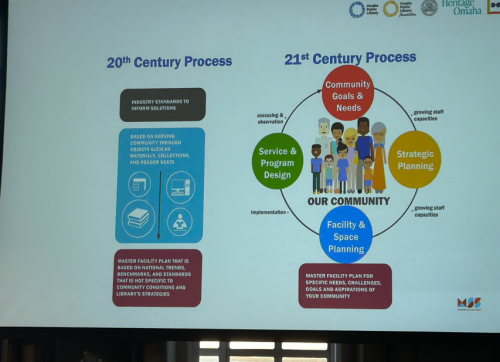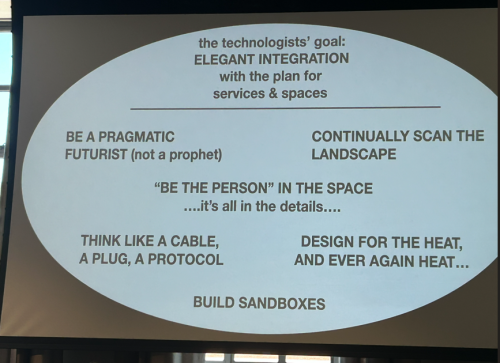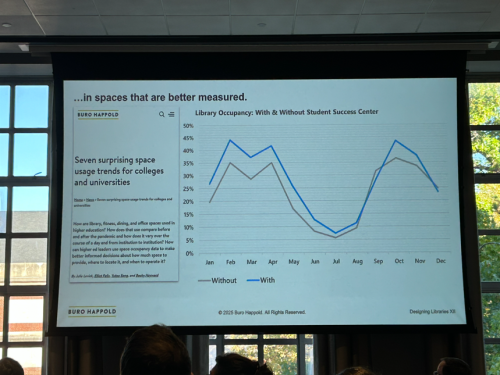The Designing Libraries for the 21st Century conference brings together architects, designers, planners, IT professionals, library administrators, and librarians from multiple disciplines to explore emerging trends, challenges, and achievements in library space design. This year’s conference was hosted at the University of Rochester’s River Campus Libraries.
Pre-Conference
The Pre-conference, Designing With, Not For: Igniting Human-Centered Design to Reimagine Library Spaces, centered around the concept of human-centered design. In this session, we explored mechanisms to engage the community in the planning of library spaces. The panelists gave an overview of different models such as design thinking, systems thinking, and creative problem-solving.
- Takeaways: Engaging the community in the design of public spaces is of paramount importance. Libraries must disabuse themselves from the notion that “if you build it, they will come.” Instead, they must explore mechanisms to engage the community in the planning process to gain relevant feedback and build meaningful partnerships.
Keynote Speaker
The keynote speaker was architect Andrew Frontini, who has led multiple renovation initiatives in academic and public libraries, including new buildings like the Hazel McCallion Academic Learning Centre, the Albion District Library in Toronto, and the Dawes Road Library
Andrew’s presentation, Episodes in Public Architecture: A Candid Reflection, focused on the need for architects, designers, library administrators, and library professionals in specific disciplines to develop functional, attractive, and comfortable spaces that connect with the community.
- Takeaways: VISION! It is imperative that library administrators and professionals in specific disciplines have a clear and cohesive vision that can help architects and designers understand the needs of users, employees, and the community. This is key to creating useful, attractive, efficient, and sustainable spaces that connect with the community. This vision, to be truly effective, needs to tell a story.
Sessions
The Public Library as Cultural and Technological Landmark: The Omaha Public Library
During this session, the panelists discussed the design process for building the Omaha Public Library. The discussion included topics such as conceptualization, community engagement, and design.
- Takeaways: Over the last 25 years, the way library spaces are used have changed drastically. The importance of evidence and data to support decisions related to space allocation, distribution, and design cannot be overstated.

From Concept to Catalyst: The Evolution of Studio X
This session focused on the evolution and impact of Studio X, the University of Rochester’s technology hub, located in the River Campus Library. The panelists described the challenges, accomplishments, and aspirations associated with this initiative.
- Takeaways: Community engagement is key to the success of library programs. Considering that university communities are constantly changing, engagement efforts need to be cyclical.
This session centered around the transformation of a space where physical collections were compacted and relocated to produce space that could be repurposed. The space was repurposed to house a new learning commons, a digital scholarship center, a data studio, a recording studio, and a makerlab.
- Takeaways: in this session, presenters used an interesting concept: “Future-proofing” spaces, which means building spaces that are flexible and can easily adapt to the changing needs of our communities.
Strategic Master Space Planning: A Roadmap for the Future
In this session, the panelists discussed methodologies for developing a holistic, structured path for scoping, prioritizing, communicating, and engaging stakeholders in space-related projects. This approach can help library administrators create strategic plans that are flexible and can quickly adapt to users’ evolving needs.
- Takeaways: My favorite session! It provided a list of practical steps to address key aspects of the strategic planning process, from conceptualization to stakeholder engagement to evaluation.

Supporting Student Well-being and Neurodiversity through Design and Programming
This session centered on the creation of spaces and programs to provide supportive environments for neurodiverse students.
- Takeaways: The importance of building partnerships with other areas of the university/community to consolidate efforts, enhance the scope of services you can provide, and maximize engagement.
Reconceptualizing Staff Spaces in Libraries and Higher Education
In this session, the panelists discussed factors that can influence the allocation, distribution, and overall scope of staff spaces. The panelists also outlined steps to successfully engage employees in the process of transforming work spaces.
- Takeaways: Fostering a sense of ownership among employees in the transformation of staff spaces is essential to the success of these initiatives.

The Designing Libraries for the 21st Century is by far my favorite conference! It takes a practical and operational approach to the development of library spaces that are efficient, functional, and visually appealing. Listening to architects, designers, and library professionals discuss their roles in space-related projects—the scope of their collaborations, as well as their successes and challenges—provides invaluable insight into how we, as librarians, can meaningfully contribute to the creation of effective and well-designed library environments. I highly recommend this conference to those interested in the design of library spaces.

6 Comments on ‘Rodrigo at Designing Libraries for the 21st Century’
Great post! Thanks for sharing this excellent info! (And I really enjoyed the “Takeaways” from each topic!)
These are some great takeaways. Thanks for sharing!
This post is contains so much valuable information! I am excited to explore these resources and really appreciate you sharing them and your takeaways.
This has been on my conference wish list for awhile. So much good stuff!
I’m so glad you went to this conference, Rodrigo! Thank you for sharing the slides and concise takeaways.
I was intrigued by your favorite session (“pragmatic” got my attention) and I clicked the link to discover that it was by Perkins&Will, who some of us have met with in the past. They have done a lot of library design! Thanks for sharing!